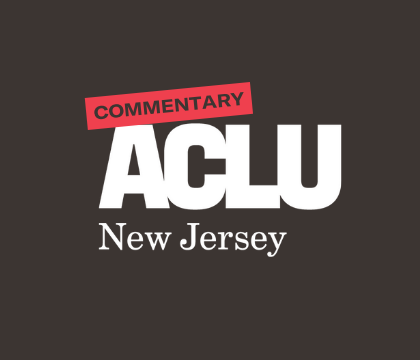Over the last month, we have learned about the horrific beating of Jayshawn Boyd and the killing of Dan Gelin at the Essex County Correctional Facility (ECCF). The violence perpetrated against both men while they were in the county’s custody and the inability — or the unwillingness — of correctional officers to protect them make clear that the jail and county leadership continue to fail the people in their care. And as prior investigations of correctional facilities and law enforcement agencies have revealed: where there’s smoke, there’s fire.
Reports of violence and egregious conditions at the Essex County jail are not new. When the jail still contracted with U.S. Immigration and Customs Enforcement in 2019, the Office of the Inspector General within the Department of Homeland Security released two scathing reports about poor conditions at the jail. In response to these reports, community members and advocacy organizations, including the ACLU of New Jersey, worked with county representatives to propose the Civilian Task Force, which would provide independent civilian oversight of the jail.
Established by ordinance in late 2019, the “Task Force is dedicated to protecting the lives, health, safety, and rights of all people confined at the ECCF and ensuring that the conditions of their confinement are safe, sanitary, respectful, and humane.” The ordinance assembled a diverse set of members and granted them extensive authority to review jail records, visit the jail, speak directly with people detained therein, and issue reports and recommendations. Advocates and scholars studying prison and jail oversight pointed to the task force as a promising development worth watching. From community partners, there was a glimmer of hope that conditions would improve.
But two years after its creation, the task force has not met some of its most basic responsibilities. It has not met its annual reporting requirement, conducted unannounced visits to the jail, or interviewed people in custody, all of which are activities listed in the ordinance. And meanwhile, the abuses at ECCF have not relented.
By studying models around the country, we know that to be effective, oversight bodies must adhere to certain principles: independence, access, and transparency. People within the jail — both those who are incarcerated and those who work there — need to trust the oversight body enough to share information, and the oversight body must be independent of the jail and its governing entity.
But recent statements from task force leadership defending the jail’s response to Mr. Boyd’s beating without any investigation, the announcement of a “joint initiative” with the county to hire a group of former law enforcement officers to review the jail’s protocols, and consistent reliance on testimony by jail leadership during task force meetings, rather than the testimony of anyone formerly or currently incarcerated, have caused advocates to believe that the task force is not, in fact, independent from the county or jail interests.
And without regular, unimpeded access to the facility and engagement with people inside, the task force will not be able to understand the conditions nor establish itself as a resource to the people incarcerated at the jail and the staff who work there. But there is no indication that the task force has ever directly engaged with people in custody at the jail, and there is currently no free and anonymous method for contacting the task force from inside the jail.
The only way for an oversight body to gain trust is by being transparent and engaging directly with the public. Yet the public has only been able to participate in select task force meetings if they attended in person, despite the ongoing COVID-19 pandemic, and appointed members have often failed to attend these meetings themselves.
The task force webpage offers little in terms of meaningful information and makes no meeting minutes available online. With too few opportunities for public engagement and minimal public information about task force activities, this is a far cry from the transparent oversight the public envisioned and enacted by the county commissioners.
It is worth acknowledging that this work is challenging, and the nine task force members are unpaid volunteers. But they are not wading into this work alone. A law firm receives $300,000 annually from Essex County to support the task force’s work, but there is no public information about how this money is spent.
Community members and advocacy organizations — some of whom lobbied in support of creating the task force in 2019 or have demonstrated in response to the continuing violence at ECCF — have a wealth of local knowledge and can provide unique insight into the challenges people face at the jail, yet the task force has not appeared to tap into these resources. The ACLU of New Jersey has offered technical support and recommendations, but our suggestions for transparency and effective information collection have gone unimplemented.
Now it’s past time for the task force to leverage all the resources at its disposal to provide the oversight and accountability vital to improving conditions at the jail. Until it does, it cannot serve as an effective check on the forces that have harmed the people inside the facility — including Mr. Boyd and Mr. Gelin — nor can it be trusted to investigate the conditions and culture within the jail that result in such violence.
This piece was originally published by The Star-Ledger/NJ.com



